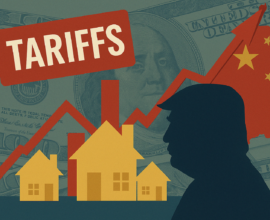Everything Real Estate Investors Should Know About Property Taxes
Understanding property taxes is crucial for Florida real estate investors, so here are the top five critical factors you should know about property taxes:
Part of being an effective Florida real estate investor involves understanding how property taxes impact your real estate investments. The reality is that relying on that November property tax statement as your sole basis for property tax planning will put you behind the curve. In this article, we’ll go over the top critical factors you should know about Florida property taxes, so you can optimize your real estate investment portfolio and avoid painful surprises.
1. The Property Assessment Process
Each year the county appraiser conducts an assessment, due by July 1 of each year, with physical inspections of real estate at least once every five (5) years. Assessments take into account the following key factors:
If you’ve done recent upgrades and want that to be reflected in the tax appraisal (to incentivize buyers to see greater value), you must inform the appraiser of these changes.
Market Value
County appraisers assess the property’s fair market value based on recent sales of comparable properties in the area. Thus, the trends for where you invest are key in considering your short- and long-term investment strategy, corresponding rents, and operations cushions.
Property Characteristics
Specific features of the property, such as size, age, construction type, and condition are used to determine its value. If you’ve done recent upgrades and want that to be reflected in the tax appraisal (to incentivize buyers to see greater value), you must inform the appraiser of these changes.
Location
The property’s location includes proximity to amenities, schools, transportation, and the overall neighborhood quality. As part of your investment strategy, you should inquire with local development boards about any development plans, which may impact the location of your properties and their corresponding values.
Land Use and Zoning
Zoning classifications and land use designations affect property values and permissible uses. If your investment property is in a mixed-use neighborhood, but is only being used as a residence, it may be less “valuable” for property assessment purposes.
Exemptions and Deductions
Consideration of any applicable property tax exemptions and deductions both prior to acquisition and after you’ve become the owner. If you purchased the property with a homestead exemption, but it will now be your rental property, there will not be a homestead exemption available, and your tax bill can change significantly! Similarly, if the property will be used for a qualified non-profit purpose, such as a community center, you may be able to minimize property taxes during the time of qualified use.
2. Millage Rates
Millage rates vary by location and are used to calculate property taxes based on the assessed value. They must be approved by the local board, and such votes are open to the public and are governed by Chapter 200 of the Florida Statutes. Millage rates have a significant impact. For example, a $300,000 value-assessed house in Monroe County will have property taxes of about $2650, whereas the same value-assessed house in Miami-Dade County will have property taxes of about $5,300, and the same value-assessed house in St. Lucie County will have property taxes of about $6,900, all based on the differing millage rates.
Remember, property tax regulations can vary by county, so it’s vital to be aware of local ordinances and changes in tax laws.
3. Homestead v. Non-Homestead Assessment Increases
When a property is the homestead (primary residence) of the owner, assessments can be capped at 3% of the prior year (so long as all owners reside there and the property is fully homesteaded). However, this cap differs with an investment property. Residential investment properties may be re-assessed at up to ten (10) percent more than the prior year. However, if the property is sold to a third party (including via foreclosure) or there are improvements that increase the value of the property more than 25%, then the real property shall be assessed at just value as of the first January 1 after the sale, changes, additions, or improvements are substantially completed.
4. Property Tax Due Dates and Penalties
In Florida, property taxes are paid in arrears, rather than in advance. What this means is that a 2023 property tax bill must be paid by March 31, 2024, to avoid penalties, tax certificate sales, and eventual Tax Deed sales. Property tax bills come out on November 1 of the year and discounts are available for early payment. Those who pay their tax bills in November receive a 4% discount, December a 3% discount, January a 2% discount, February a 1% discount, and in March the gross amount is due. Property taxes are delinquent if paid on or after April 1. In April, a 3% penalty is added to the gross tax. This can quickly add up as a $4000 tax bill can become $4,120 in April (and it would have been only $3,840 if paid in November of the prior year!).
Consulting with a local zoning or property tax real estate attorney is strongly recommended.
5. Property Tax Appeals
Property owners have the right to appeal their property assessments if they believe they are inaccurate. Florida law provides a specific process for challenging assessments. If a taxpayer disagrees with the assessment imposed on any property that is subject to taxation, including the assessment of homestead property valued below its just value as per s. 193.155(8), they have the right to request an informal conference with the property appraiser. Once the request is made, the property appraiser or a designated member of their staff will engage in a discussion with the taxpayer to address concerns and assess the accuracy of the valuation. Alternatively, taxpayers can file a petition with the Value Adjustment Board before the 25th day after the county/municipality sends out the proposed assessment notices. Usually, these notices are mailed out on August 1 of each tax year. The Value Adjustment Board may hold a hearing, and it is up to the taxpayer to present evidence in support of what they think is the proper appraisal value.
Conclusion
While this is not an exhaustive list of all critical factors that should be considered when engaging in proactive property tax planning for your real estate investments, it is an essential starting point. Remember, property tax regulations can vary by county, so it’s vital to be aware of local ordinances and changes in tax laws. If you have specific questions about your property or need further clarification, consulting with a local zoning or property tax real estate attorney is strongly recommended.








